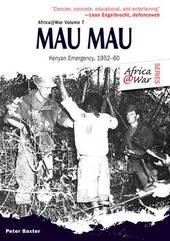
|
Mau Mau: The Kenyan Emergency 1952-60
Paperback
Main Details
| Title |
Mau Mau: The Kenyan Emergency 1952-60
|
| Authors and Contributors |
By (author) Peter Baxter
|
| Series | Africa@War |
|---|
| Physical Properties |
| Format:Paperback | | Pages:72 | | Dimensions(mm): Height 210,Width 290 |
|
| Category/Genre | African history
Military history |
|---|
| ISBN/Barcode |
9781908916228
|
| Classifications | Dewey:967.6204 |
|---|
| Audience | |
|---|
| Illustrations |
8 pages colour photos, many b/w photos, maps
|
|
Publishing Details |
| Publisher |
Helion & Company
|
| Imprint |
Helion & Company
|
| Publication Date |
15 July 2012 |
| Publication Country |
United Kingdom
|
Description
The Second World War forever altered the complexion of the British Empire. From Cyprus to Malaya, from Borneo to Suez, the dominoes began to fall within a decade of peace in Europe. Africa in the late 1940s and 1950s was energised by the grant of independence to India, and the emergence of a credible indigenous intellectual and political caste that was poised to inherit control from the waning European imperial powers. The British on the whole managed to disengage from Africa with a minimum of ill feeling and violence, conceding power in the Gold Coast, Nigeria and Sierra Leone under an orderly constitutional process, and engaging only in the suppression of civil disturbances in Nyasaland and Northern Rhodesia as the practicalities of a political handover were negotiated. In Kenya, however, matters were different. A vociferous local settler lobby had accrued significant economic and political authority under a local legislature, coupled with the fact that much familial pressure could be brought to bear in Whitehall by British settlers of wealth and influence, most of whom were utterly irreconciled to the notion of any kind of political handover. Mau Mau was less than a liberation movement, but much more than a mere civil disturbance. Its historic importance is based primarily on the fact that the Mau Mau campaign was one of the first violent confrontations in sub-Saharan Africa to take place over the question of the self-determination of the masses. It also epitomised the quandary suffered by the white settler communities of Africa who had been promised utopia in an earlier century, only to be confronted in a post-war world by the completely unexpected reality of black political aspiration. This book journeys through the birth of British East Africa as a settled territory of the Empire, and the inevitable politics of confrontation that emerged from the unequal distribution of resources and power.
Author Biography
Peter Baxter is an author, amateur historian and African field, mountain and heritage travel guide. Born in Kenya and educated in Zimbabwe, he has lived and travelled over much of southern and central Africa. He has guided in all the major mountain ranges south of the equator, helping develop the concept of sustainable travel, and the touring of battlefield and heritage sites in East Africa. Peter lives in Oregon, USA, working on the marketing of African heritage travel as well as a variety of book projects. His interests include British Imperial history in Africa and the East Africa campaign of the First World War in particular. His first book was Rhodesia: Last Outpost of the British Empire; he has written several books in the Africa@War series, including France in Centrafrique, Selous Scouts, Mau Mau, SAAF's Border War and Somalia: US Intervention, 1992-1994.
|